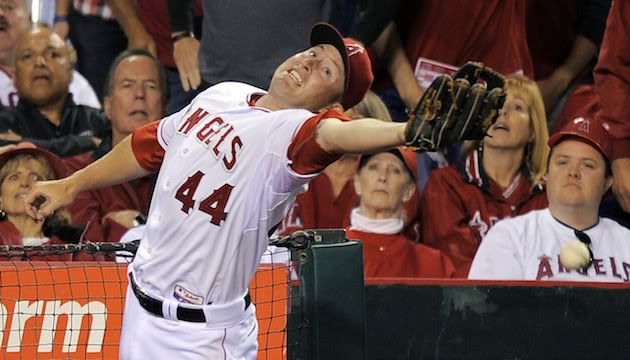 Earlier this week, Fangraphs posted this article wondering why it is first basemen are paid so much more relative to WAR than other positions. There’s a lot of interesting discussion in the piece on the causality of all that, but what really got me thinking is the first table showing the millions of dollars per WAR by defensive position. Specifically, it got me thinking about Mark Trumbo.
Earlier this week, Fangraphs posted this article wondering why it is first basemen are paid so much more relative to WAR than other positions. There’s a lot of interesting discussion in the piece on the causality of all that, but what really got me thinking is the first table showing the millions of dollars per WAR by defensive position. Specifically, it got me thinking about Mark Trumbo.
Mark Trumbo is nominally a first baseman, but that is a thing of the past thanks to Albert Pujols. That’s good news because according to that post, first basemen are very high-priced. As it currently stands, Mark is now a left fielder, he’s a work in progress there, but that is where he is going to play most of his games for the rest of this season. That’s not so good news because, as the chart shows, left fielders are also very expensive, in fact, more expensive per WAR than first basemen.
What we don’t know is what the future holds for Trumbo’s primary defensive designation. Fortunately, the Angels have several years to figure that out before Trumbo hits the open market. But it is a problem worth thinking about now because if he keeps hitting like he is this season, he is going to be in line for a massive payday. But the exact size of that payday looks like it might be something the Angels can manipulate depending on what position on the field they lock him into.
We all saw how poorly Mark Trumbo’s transition to third base went early on in this season, but after looking at that $/WAR chart, there is a great deal of financial sense in revisiting the experiment. For whatever reason, GMs aren’t throwing big money at third basemen, although part of that could be that there has been a relative dearth of talent at the hot corner the last few years. Nonetheless, it does look like there is something of a market inefficiency that the Halos could take advantage of while also plugging a roster hole at the same time.
Simplifying down from all the sabermetrics in the article, I would posit that if Trumbo were to continue producing as a top slugger who is a below average defender at third base rather than as a below average defender in left field, the Angels could save several million dollars when it comes time to lock Trumbo into a long-term contract. GMs don’t seem to care so much about defense in left field but they do at third base. In other words, if he is costing the team runs in the field at third, it is going to decrease his value much more than if he is costing the team runs in left field. Judging by the disparity in the $/WAR numbers that difference in defensive value could be more than enough to offset the relative scarcity of bats as potent as Trumbo’s that can play third base.
Therein lies the rub though. Getting Trumbo to become even a below average third baseman seems like a tall order. While he showed promise in spring training, he was an unmitigated disaster once the regular season started. However, and this might be the cognitive dissonance talking, a fractured foot kept him from prepping for the shift across the diamond during the off-season. Give him a full off-season to learn the position and maybe he can actually get good enough to fake it at third.
But that is only part of the problem, the other complication is that the Angels would have to be willing to sacrifice runs on the field in order to artificially deflate Trumbo’s perceived value all for the sake of getting him to sign a five-year, $80 million contract instead of a five-year, $88 million after the 2016 season. That’s some pretty hardcore long-term planning right there. However, it does come with the pleasant side effect of the Angels maximizing their current roster by plugging the hole at third, for which no legit prospect is within two seasons of occupying, and once again clearing the path for Peter Bourjos to play everyday.
I don’t know, maybe I am misinterpreting the findings from the original article, in which case having Trumbo play third would only make him more expensive. Or maybe Trumbo just ends up having such a special bat that he will get paid top dollar regardless of the position he plays. It is even possible that there is no need to manipulate his value since he seems like a prime candidate to take a hometown (literally) discount. Or maybe his plate discipline begins to erode and by the time he hits free agency he is no longer worth locking up (sorry, but the possibility has to be mentioned).
Whatever the case, I have the feeling that this whole exercise, while well intentioned, is based on a bad premise. The notion that the Angels would make a major decision like what defensive position one of their young stars will play based off of future potential financial savings rather than what is best for the team in terms of winning games doesn’t seem to jive the way Mike Scioscia, Jerry Dipoto or Arte Moreno operates.
